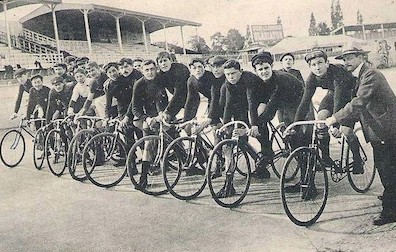The identity of one of the lesser figures in Stephen's list
of creditors in Nestor, "Bob Reynolds," remained a
mystery until recently. It now seems certain that the
reference is to one of Oliver Gogarty's cycling friends, who
was four years older than Joyce.
Gifford expresses uncertainty about who Reynolds may be.
Other annotators of Ulysses (Kiberd, Johnson, Slote)
simply ignore the reference. But Vivien Igoe, in her 2016 book
The Real People of Joyce's Ulysses, identifies him as
Robert "Bob" Reynolds (1878-1959), a Balbriggan-born man who
"joined the local Wanderers Cycling Club as a teenager. He was
a cycling companion and friend of Oliver St John Gogarty. In
the 1890s Reynolds and his brother Harry, an extraordinarily
talented cyclist, made cycling history participating in many
overseas events. Bob came in third in the World Mile
Championship at Copenhagen and competed in the grand cycling
and athletic tournament held in Ballsbridge on 16 April 1900.
Known for his famous pop-gun sprints, he won the Half Mile
Championship of Ireland in Waterford on 2 July 1901."
Igoe's identification is almost certainly correct given Bob
Reynolds' age and connection to Gogarty. Annotators of the
novel would have cottoned on to it much earlier if they had
consulted Ulick O'Connor's biography Oliver St John
Gogarty (1963). O'Connor first mentions Reynolds while
introducing Gogarty's own great prowess as a cyclist: "'Oliver
Gogarty', recalls Robert Reynolds, 'was a first-rate cyclist.
You had to watch him like a hawk in a race. If you took your
eyes off him for a second he was past in a flash, with his cry
of "up, up Balrothery." You see we trained on Balrothery
Straight.' Reynolds was third in the world mile championship
at Copenhagen. In 1900 Gogarty won the scratch mile in the
college races and the mile and five-mile double at the RIC
sports in Ballsbridge.
"In the latter race there was a crash in which five men were
badly injured. Gogarty often had to come down to breakfast
with gloves on to hide his lacerated hands from his aunt, who
disapproved of cycling on social grounds. It was exceptional,
actually, for a Trinity student to compete in open competition
as Gogarty did, and he was often embarrassed to read his name
on the hoardings, for fear his aunt might spot it and come
down on him. This was his last year cycling. The following
year, 1901, he was suspended for bad language. Three cyclists
tried to ram him, and he let go with a volley of oaths which
were heard by the judges. Though Bob Reynolds offered to
appeal for him, Gogarty wouldn't hear of it and never raced
again. His suspension in his own opinion may have done him a
favour. It made him wake up to the fact that there was a
Literary Renaissance going on around him" (26-27).

